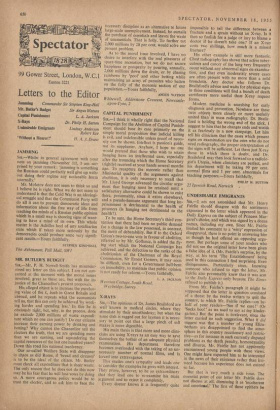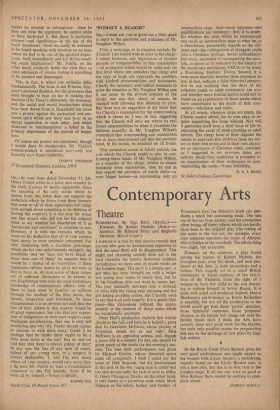UNDESIRABLE EMIGRANTS
S111,--1 am not astonished that Mr. Henry Fairlie should disagree with the sentiments expressed in the letter which appeared in the Daily Express on the subject of Princess Mar- garet's choice, and which was signed by a dozen names, including my own. Since Mr. Fairlie limited his comment to a 'witty' expression of disapproval, there is no point in answering him as though he had offered an opposing argu- ment. But perhaps some of your readers who did not see the original letter have been given a false idea of it. (Mr. Fairlie's surprise, by the way, at his term The Establishment' being used in this connection I find surprising. Even disingenuous. Particularly since, knowing someone who refused to sign the letter, Mr. Fairlie also presumably knew that it was sent to the Daily Express only because The Times refused to publish it.) From Mr. Fairlie's paragraph it might be supposed that the letter in question consisted of a threat by the twelve writers to quit the country, to which Mr. Fairlie replies—on be- half of your readers—'See if we care!' (Or 'Sucks boo!' as we used to say at my kinder- garten.) But the point is irrelevant, since the letter carried no such suggestion. What it did suggest was that a number of young Eliza- bethans are disappointed to find the atmo- sphere in this country reactionary and restric- tive—as for instance in such currently disputed problems as the death penalty, homosexuality and divorce. Mr. Fairlie has not apparently encountered; young people with these views. One might have expected him to be interested in the news of their existence rather than irri- tated because his experience does not extend so far.
But that is very much a side issue. The essential point of our letter Mr. Fairlie does not discuss at all, dismissing it as 'incoherent and emotional.' The first of these epithets he
makes no attempt to substantiate : since he does not state the argument, he cannot claim to have destroyed it. But there is particular interest—and significance—in his use of the word 'emotional.' Need we really be ashamed to be found speaking with emotion on an issue which we feel to be one of the greatest impor- tance, both immediately and for its far-reach- ing social implications? Mr. Fairlie, on the other hand, evidently holds the view that an open admission of sincere feeling is something to be mocked and disparaged.
This, in fact, is where our attitudes differ fundamentally. The issue is not Princess Mar- garet's personal decision, but the pressures that were brought to bear on her in making that decision (The Times's ultimatum, for instance), and the social and moral implications which have been drawn from it. Essentially our letter was a protest against the puritanical and per- verted spirit which sets 'duty' and 'love' in an unreal opposition to each other, and which dismisses as 'sentimentalism' a belief in the Primary importance of the pursuit of happi- ness.
Of course our protest was emotional, though would deny its incoherence. Mr. Fairlie's counter-protest is emotional too—only less honestly so.—Yours faithfully,
LINDSAY ANDERSON
57 Greeneroft Gardens, London, NIV6











































































 Previous page
Previous page